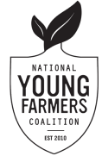Hannah Breckbill is a Land Advocacy Fellow with the National Young Farmers Coalition and co-owns Humble Hands Harvest, a worker-owned cooperative farm in the Driftless region of Northeast Iowa. This letter to the editor was first published in Decorah News in February 2024.
I live and farm here in Iowa, known for its rich soils and named for one of the native tribes that call this land home. Iowa is also the most altered—or “developed”—state in the U.S. Ninety-nine percent of the land here has been changed from its natural condition to fit the purposes of the settler-colonial economy: some people even call Iowa a “sacrifice zone,” meaning that the land, water, and air here can be poisoned by industry, and human communities can be gutted, so that other places can be spared.
For the past several decades, the farm bill has been a primary policy vehicle governing the way land is used in Iowa. The subsidies and crop insurance for corn and soybean production have incentivized the monocropping of the state, failed to prevent the degradation of our soils and waterways, and have driven up the price of land, thus impairing the ability of beginning farmers to access land independently.
Members of Congress are currently writing and debating the next farm bill. We need a farm bill that shifts power to farmers and people in rural communities, and away from consolidated power and corporate control in agriculture and food systems. One piece of the policy puzzle is to include the “Increasing Land Access, Security, and Opportunities Act (HR.3955, S. 2340)” in the next Farm Bill.
I started a vegetable operation named Humble Hands Harvest in 2013 on a couple acres of rented land. I learned about the power of tree crops to regenerate soil and sequester carbon, and soon hit a wall when it came to figuring out how to put ideas into action. Without long-term access to land, I didn’t have a way to lend my labor to the soil-building mission of perennial cropping, and I couldn’t see a way forward to land ownership or a long-term lease with my farm business so new and on a shoestring budget.
Luckily, a community member named Steve McCargar in Decorah acted in early 2014 when a 22-acre piece of land at the end of his dead-end road was put up for sale. Worried a CAFO operator would be the highest bidder and degrade the neighborhood, he had a conversation with the landowner and she named a price. Within three weeks, Steve found sixteen local community members to join together as an LLC to purchase the 22 acres and manage it democratically with an eye toward health of the land and the neighborhood.
I joined that LLC from the beginning, and shared my vision for a diversified farm. The other shareholders trusted and supported that vision. Over the next nine years Humble Hands Harvest was able to acquire the property, share by share.
I now co-own Humble Hands Harvest as a worker-owner and our business is thriving. We’re producing more food every year for our community, we’re gradually increasing our wages and improving our work-life balance, and we’re making strategic decisions about the infrastructure we invest in next. I am proud of everything we’ve accomplished, and I know that none of it could have happened without the community of people who invested in the land and made the effort to transition it to us.
This brings me back to the farm bill, and in particular the “Increasing Land Access, Security, and Opportunities Act” also known as the LASO marker bill. Past farm bills supported and enabled the forms of agriculture and the consolidated ownership that we see dominating our landscape. With LASO as part of the next farm bill, the federal government and taxpayer dollars can invest in community-led projects that create secure, affordable, and equitable land access opportunities—like the LLC that created the land access opportunity for my farm, or the Farmers Land Investment Cooperative (FLIC) that is just starting in Decorah!
If we are able to democratize land-holding by enacting policies that support smallholders, farmer ownership, and community input on how land is used, we will transform the landscape. Join me in asking our Iowa delegation to Congress to support the LASO marker bill! I am so excited to realize a future that is life-giving and generative. That future will come with hands in the soil doing the long-term work and a Farm Bill that directs support to those workers and their communities.
Hannah Breckbill
Decorah, Iowa
